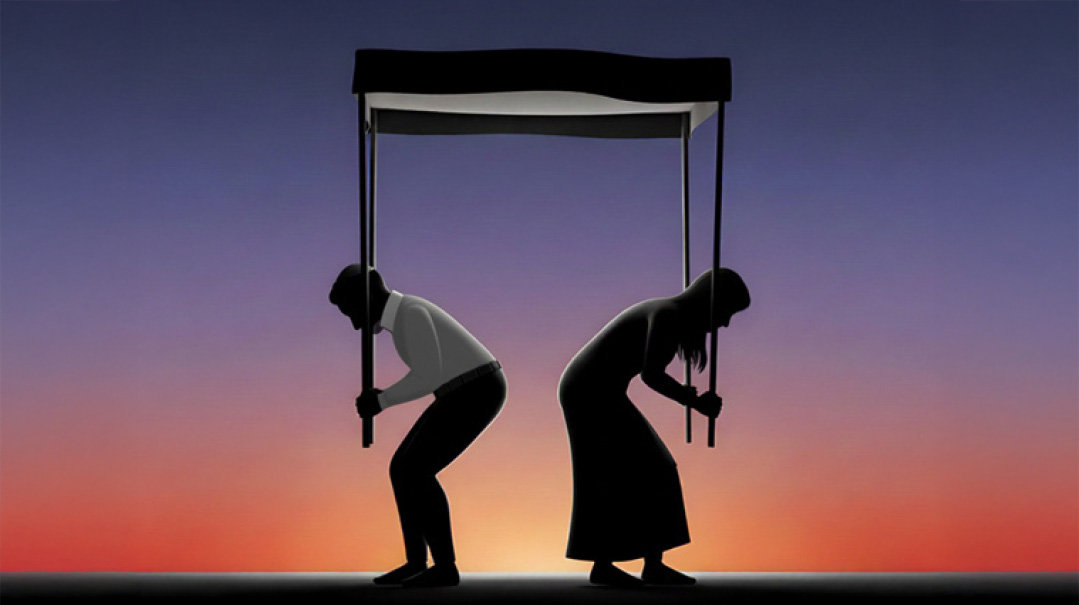Burst Bubble

I always tell people that working at Mishpacha is like an accounting job with two tax seasons; the catch is that both inevitably fall out during the busiest seasons in a Jewish home. Just when the pressure of Yom Tov preparation is highest — during the Yamim Noraim pre-Succos season and before Pesach — that’s when the magazine pressure peaks.
After the frenetic Pesach preparations that overtake so many aspects of our lives, the actual Yom Tov feels like another planet. We’ve just spent weeks glued to our computers, losing track of day and night, focusing intensely on the Yom Tov package. Somehow we make it to Yom Tov (every staff member has his or her own resources and coping mechanisms to make it there, and some details are best left unspoken) and gratefully enter a cocoon of family togetherness. During this otherworldly week, our schedule revolves around leisurely meals and family outings. Our desks and computers feel very far away.
For most people, climbing out of that cocoon tends to be a gradual process. It takes a few days for the tempo to pick up — for bedtime no longer to be a friendly suggestion, for mornings to feel urgent again, for magazine grids to take on the same immediacy they held two weeks earlier.
But come Isru Chag, when much of the world is still rubbing its eyes, when chometz is still a fresh delight, when the mountains of sorted and spritzed laundry are still impassively waiting their turn for the washing machine, we inevitably bid goodbye to our sleepy homes and return to the office.
The last time we’d been there it was pulsing with purpose and energy of a massive team effort stretching late into the night. There was an almost-audible drumbeat of tension accompanying the steady parade to the coffee station. There were nightly supper deliveries. There was a graphic designer reading bedtime stories to her son over the phone as work hours extended long past any hope of seeing him awake.
In the post-Pesach fog, it’s a very different office. Yes, deadlines beckon, but the dimensions of the final product are entirely different (no mega-issues on the horizon). So there’s usually a quiet exchange of pleasantries — the funny and fun times together, the reading highlights of the week, the hit recipes — and then everyone sits down at the computer and gets back to work. No one wants a late night.
For these issues, we often plan what we call “evergreen” stories — features that aren’t pinned to any specific date, so they will always feel current. But sometimes — to be honest, more often than not — those well-meant plans need to be set aside because of breaking news.
That’s what happened this year. We hoped for a soft landing, a gentle glide from the Pesach cocoon into the closing schedule. It would have been so nice to give our writers and editors another couple of days of reprieve before sending them urgent deadlines. But as much as we try to consider the feelings and energy level of our staff, our primary responsibility is always to our readers. So as soon as we tuned back into the news feed, we realized we’d have to prepare a full report on the horrific shooting in Poway. Then, as we adjusted our grids and reworked our plans, word came in that the Kaliver Rebbe had been niftar. We took a few deep breaths and adjusted our plans yet again. Pesach was barely over and much of the world was still waiting on line at the pizza store, but we had to prepare two breaking stories.
Because both of those breaking stories were also heartbreaking stories, it also means that the magazine doesn’t have the balance we always aim for: something heavy, something light, something thought-provoking, something entertaining. But that’s part of this magazine’s mandate, too. As much as we try to shape a perfectly balanced product, it’s always a reflection of the tenor of our lives as a global community. And this week it reflects the rude puncturing of that golden Pesach bubble.
(Originally featured in Mishpacha, Issue 758)
Oops! We could not locate your form.







